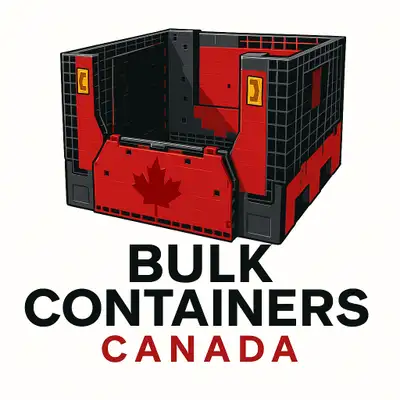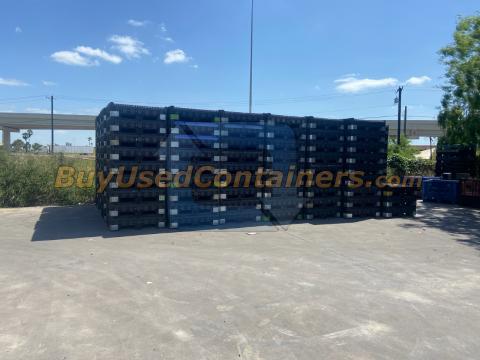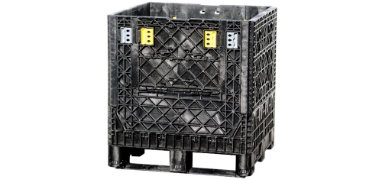How used bulk containers improve storage efficiency across industries
Why Mass Containers Are Crucial for Lasting and Affordable Transportation
Mass containers play a necessary function in modern logistics. They promote the efficient activity of big amounts of goods, therefore optimizing transport procedures. This approach not only lowers expenses however likewise reduces environmental impact through reduced discharges and waste generation. As markets seek even more lasting techniques, the adoption of mass containers is ending up being progressively significant. What ramifications does this shift hold for future logistics and supply chain administration?

The Benefits of Utilizing Bulk Containers in Logistics
Mass containers reinvent logistics by improving performance and sustainability. These containers enable the transportation of huge amounts of items in a solitary trip, substantially minimizing the number of trips required. This not just streamlines operations however additionally decreases labor expenses connected with handling, loading, and discharging. Additionally, bulk containers are made to maximize space utilization within transportation lorries, making sure that even more items can be delivered concurrently.
The standardization of bulk containers also streamlines the logistics process. With uniform measurements, they can be easily piled and stored, causing enhanced stockroom management. In addition, bulk containers often include durable products that protect contents from damage throughout transit, thereby decreasing item loss and raising overall integrity. Because of this, services can experience enhanced supply chain performance, inevitably bring about raised success and consumer satisfaction. This combination of variables makes mass containers a vital possession in modern logistics.
Ecological Impact: Reducing Waste and Carbon Footprint
As markets increasingly prioritize sustainability, the fostering of mass containers has actually arised as a key technique for minimizing waste and lowering carbon impacts. These containers lessen making use of product packaging materials, such as boxes and plastic, thus especially lowering total waste generation. By combining shipments, bulk containers boost transportation effectiveness, permitting even more items to be transported per trip. This reduction in journeys directly correlates with lower greenhouse gas exhausts, adding to a smaller sized carbon footprint.
Furthermore, mass containers can typically be reused or recycled, even more mitigating ecological effect. The resilience of these containers assurances they can stand up to multiple transport cycles, reducing the need for single-use alternatives. used collapsible containers. By enhancing logistics and promoting reliable source usage, bulk containers not just sustain sustainable methods but additionally motivate sectors to align with worldwide environmental objectives. Inevitably, their execution reflects a dedication to ecological stewardship and accountable source management
Price Financial Savings: Just How Bulk Containers Lower Transport Expenses
While many firms seek ways to boost their bottom line, making use of bulk containers presents a substantial chance for lowering transport costs. Mass containers make the most of the quantity of products moved, permitting companies to ship larger quantities simultaneously. This effectiveness decreases the variety of journeys called for, straight decreasing fuel costs and lessening labor expenses connected with loading and unloading.
Furthermore, mass containers typically feature streamlined styles that enhance space use within transport vehicles. This suggests less vacant spaces, causing more effective use available capacity. The resilience of bulk containers can decrease the threat of item damages during transportation, making sure and minimizing losses that more products show up intact.
Enhancing Supply Chain Performance With Bulk Storage Solutions
Mass storage space services play a necessary function in enhancing supply chain effectiveness by optimizing supply monitoring. By consolidating goods right into less, larger containers, companies can considerably reduce handling costs connected with regular transfers and processing. This structured strategy permits far better monitoring and monitoring of stock, eventually leading to enhanced functional performance.
Streamlined Stock Management
Reliable stock monitoring is crucial for maximizing supply chain operations, especially when companies embrace bulk storage options. These services enable organizations to maintain greater supply degrees while decreasing the regularity of replenishment. By combining products into mass containers, firms can simplify their stock processes, minimizing the intricacy related to tracking multiple smaller packages. This technique facilitates exact inventory counts and improves projecting precision, permitting even more enlightened decision-making. In enhancement, mass storage services streamline storehouse organization, making it easier to situate and gain access to items when needed. As an outcome, companies can achieve an extra efficient inventory turn over price, inevitably improving general supply chain efficiency and lowering the possibility of stockouts or overstock scenarios.

Lowered Handling Prices
The execution of bulk storage services not just simplifies inventory administration however additionally significantly decreases managing expenses throughout the supply chain. By combining materials right into bulk containers, companies decrease the need for constant handling and transfer in between different storage and transportation units. This method lowers labor prices connected with loading, discharging, and moving smaller packages. Furthermore, mass storage reduces the frequency of deliveries, bring about lower transportation costs and reduced fuel consumption. Consequently, services can enhance their logistics operations, permitting a more reliable appropriation of resources. Inevitably, decreased taking care of costs add to boosted general supply chain effectiveness, promoting an atmosphere that sustains both sustainability and economic stability.

Flexibility of Mass Containers Across Different Industries
Lots of industries have distinctive demands for transportation and storage, bulk containers have arised as a functional service that fulfills a large range of demands. These containers, ranging from large containers to specialized tanks, can fit diverse materials, consisting of liquids, powders, and granules. In the farming market, mass containers assist in the transportation of plant foods and grains, while the food and drink industry uses them for active ingredients and finished products. The chemical industry relies upon bulk containers for safely delivering dangerous products, making certain compliance with safety and security policies. Additionally, building companies take advantage of mass containers for moving accumulations and various other products. Their flexibility reaches different modes of transport, including trains, vehicles, and ships, enhancing logistical effectiveness. This flexibility not only enhances procedures across various sectors yet also advertises sustainability by minimizing product packaging waste and enhancing room in transportation. Bulk containers play a vital duty in contemporary supply chain administration.
Future Trends wholesale Container Use and Sustainability
The future of mass container usage is increasingly shaped by ingenious materials advancement that boosts sustainability. Furthermore, automation in logistics guarantees to enhance procedures, minimizing waste and enhancing efficiency. Embracing circular economic climate methods will further transform exactly how bulk containers are created, made use of, and reused, cultivating a more lasting transport landscape.
Cutting-edge Materials Development
As sectors increasingly prioritize sustainability, innovative materials advancement wholesale containers arises as a substantial consider boosting green transportation services. Researchers and producers are discovering biodegradable plastics, recycled composites, and lightweight steels to minimize ecological influence. These products not only minimize waste but also enhance gas performance by reducing the general weight of containers. In addition, advancements in wise materials, which can adjust to differing conditions, enhance the durability and capability of mass containers. The integration of these ingenious materials aligns with round economy concepts, advertising reuse and recycling. As the demand for lasting read more techniques expands, the advancement of such materials will certainly play a crucial function fit the future of mass container use in logistics and transportation.
Automation in Logistics
Considerable developments in automation are positioned to transform logistics and the usage of bulk containers, boosting sustainability in transportation. Automated systems, including drones and autonomous cars, are enhancing the motion of bulk containers, lowering the dependence on typical fuel-powered transport. These technologies maximize routing and loading procedures, decreasing empty miles and enhancing gas performance. Furthermore, automated inventory monitoring systems boost monitoring and tracking of mass containers, making certain much better resource allotment and decreased waste. The assimilation of the Web of Points (IoT) allows real-time data evaluation, enabling aggressive decision-making that aligns with sustainability goals. As automation remains to develop, it is expected to drive additionally developments wholesale container use, inevitably sustaining more sustainable logistics methods and decreasing the environmental effect of transportation.
Circular Economic Climate Practices
Improvements in automation are setting the phase for a more incorporated technique to round economic situation methods in the domain of mass container usage. As sectors progressively accept sustainability, mass containers are being made for durability and reusability. This change not just minimizes waste but likewise boosts resource effectiveness. Companies are embracing methods such as closed-loop systems, where made use of containers are gathered, reconditioned, and reestablished right into the supply chain. Additionally, smart technologies track container life process, assisting in better administration and reducing ecological effect. The collaboration in between makers, logistics providers, and end-users is important in establishing criteria for lasting container usage. used plastic containers. Future trends suggest an expanding focus on products that are eco-friendly and recyclable, additional reinforcing the circular economy's principles wholesale transport

Often Asked Concerns
What Materials Are Mass Containers Usually Made From?
Bulk containers are normally built from long lasting products such as high-density polyethylene, cardboard, steel, and light weight aluminum. These materials offer toughness, convenience, and protection, making them appropriate for transporting different goods in different markets successfully.
Exactly how Do I Select the Right Size Mass Container?
Choosing the right dimension bulk container involves assessing the quantity of materials to be moved, considering dealing with devices compatibility, and evaluating storage room needs. Appropriate size warranties performance in transport and minimizes waste during delivery.
Are Mass Containers Reusable or Recyclable?
Bulk containers are often multiple-use, developed for several trips, enhancing sustainability. Numerous can likewise be recycled, relying on the materials utilized. Selecting recyclable options additionally supports environmental goals and decreases waste in transport practices.
What Security Regulations Apply to Mass Container Transport?
Security policies for bulk container transportation consist of conformity with the Division of Transport guidelines, appropriate labeling of dangerous materials, structural stability evaluations, and adherence to weight restrictions to guarantee safe handling and protect against accidents during transportation.
How Can Companies Change to Using Bulk Containers Properly?
Services can alter to bulk containers by reviewing present logistics, educating team on handling, spending in suitable equipment, optimizing supply management, and collaborating with providers to guarantee compatibility and performance throughout the supply chain.
As markets significantly prioritize sustainability, the adoption of bulk containers has emerged as an essential method for lowering waste and reducing carbon footprints. By consolidating products into mass containers, firms can streamline their supply processes, reducing the complexity connected with tracking several smaller bundles. As sectors significantly focus on sustainability, ingenious products advancement in mass containers emerges as a considerable factor in enhancing environmentally friendly transportation solutions. Automated systems, including drones and independent vehicles, are streamlining the movement of bulk containers, lowering the dependence on standard fuel-powered transport. Furthermore, automated supply management systems boost tracking and tracking of bulk containers, guaranteeing better resource allocation and lowered waste.